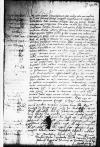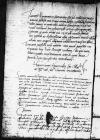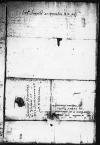Iucundissimum fuit auditu mihi, cum intellexi, Dominationi Tuae proximis comitiis contigisse magistratum et amplum et honorificum. Felix nimirum successio; nam qui potuit ⌊Victori⌋, purissimo atque integerrimo viro, alius te uno, qui illius esset simillimus, iustius succedere, sub quibus frugi homines et rectorum studiorum cultores feliciter haud dubie vitam agunt? Nimis equidem vellem isthic per hoc tempus una vobiscum vivere et praesentia vestra ac consuetudine suavissima perfrui. Nunc autem, postquam eo fortunae res meae sunt impactae, ut iugum auribus planissime tenere videar, hoc superinscribed in place of crossed-out ...⌈... illegible⌈...... illegible⌉ hoc hoc superinscribed in place of crossed-out ...⌉ remedii est, ut quicquid accidit, id ne violenter feram; magno opere studeam. Mitto epistolam ad ⌊Paulum Iovium⌋ a me superioribus diebus factam, quam ad alias nugas meas adponi cupio. Maxime miror, Magnificentiam Vestram et ⌊Collimitium⌋ nihil rescribere, et incertus
sum, acceperintne Dominationes Vestrae mea poemata ms. poematia(!)
⌈poematapoemata ms. poematia(!)
⌉. Postremo, quod imprimis scire affectavi, de profectione reverendissimi ⌊Vratislaviensis episcopi⌋ in urbem ⌊Romam⌋ nihil adhuc accepi; oro itaque, ut hac saltem in parte, videlicet scribendi officio, et Magnificentia Tua et ⌊Collimitius⌋ quamlibet raro ⌊Gaspari⌋ Vestro, nominis Vestri studiosissimo, respondeatis. Ego hic ex omni familia Gurcensi solus vitam traho, spemque metumque inter dubius, ac nisi maiorem diei partem cum domino ⌊Dantisco⌋ insumerem, animum desponderem, cuius mihi consuetudo ac morum suavitas multo iucundissima est. Is quidem mortalis, immortalitate dignus, quamquam et amat et observat Vos omnes plurimum, tamen parum aequo animo tolerat Vestram tam diuturnam ac paene nimiam taciturnitatem. Haec ego in triumviratu escario ms. aescario(!)
⌈escarioescario ms. aescario(!)
⌉ scripsi; collegae subscripsere.
Quoniam[2] quidem amplius, enim vero toties tibi, Magnifice, quisquis es, scripsi, qui scilicet Tui studiosissimus, ut me semper offendisti, nihil tamen hactenus rescribis; nec mirum, cum tantum sis evectus, in summum utpote gradum; sed decides post annum; ne superbi igitur. Debuisses aliquid respond text damaged⌈[ond]ond text damaged⌉isse; proinde impraesentiarum, quia ⌊Ursinus⌋ poculum text damaged⌈[lum]lum text damaged⌉ effert, cesso; do requiem manui et, ut magnificus es text damaged⌈[es]es text damaged⌉ vel magnifici operae pretium duxi, magnificum titulum meum T<h>eophr<a>stice subscribere; ridebis etc.
⌊Ioannes Dantiscus⌋, eques Hieros(olymitanus), utriusque iuris doctor, poeta laureatus, canonicus Varmiensis, ⌊serenissimi Poloniae regis⌋ etc. nuntius et secretarius, Tuus tamen qualiscumque.
 VSSG, Ms. 30, f. 84v
Tametsi et quamvis in superioribus istis litteris nulla mei pauperis mentio facta sit, cum et aequo animo bibam combibamque frequentius, volui tamen et meas illis addere characteres, ut et me vivum incolumem huc adventasse et Vestrum esse cognoscatis. Ceterum quod mihi restat, scio: scilicet, ut illi aemulo obviando me opponam ac disertissimas illas obscurorum virorum epistolas ad vos cum nugarum aliquarum additione transmittam. Tremant profecto mihi manus, cum mecum pensito, cui et quanto viro et nostro principi scribam; Vos, qui iam altiore gradu constituimini, mei etiam, cum bona pocula laete sum(p)seritis, recordamini.
VSSG, Ms. 30, f. 84v
Tametsi et quamvis in superioribus istis litteris nulla mei pauperis mentio facta sit, cum et aequo animo bibam combibamque frequentius, volui tamen et meas illis addere characteres, ut et me vivum incolumem huc adventasse et Vestrum esse cognoscatis. Ceterum quod mihi restat, scio: scilicet, ut illi aemulo obviando me opponam ac disertissimas illas obscurorum virorum epistolas ad vos cum nugarum aliquarum additione transmittam. Tremant profecto mihi manus, cum mecum pensito, cui et quanto viro et nostro principi scribam; Vos, qui iam altiore gradu constituimini, mei etiam, cum bona pocula laete sum(p)seritis, recordamini.
⌊Hieronimus Hamerbeo⌋, ⌊caesareae maiestatis⌋ etc. ac reverendissimi domini ⌊cardinalis Gurcensis⌋ secretarius etc.
Simitu[3] conscribillavimus epistolia tumultuatim consarcinata. ⌊Dantiscus⌋ mortalis Papaeus, noster sociennus oculissimus, sympotas nobis ductavit senecionem doliarem bucculentum cum Amasia tricenaria perterebrata trioboli muliere. Symposium Saliare hercle et struices patinariae et missus basilici, nempe alleculae excoriatae, echinatae nuces, Pomonae opes fructuariae, panis cum secundario geniturae primariae assati, tum alia pluscula. Corbitavimus tuburcinavimusque pancratice et syrrepsiter. Cenaturiret saturio Antonianus, si adsit.
Interea[4], quo haec legi paper damaged⌈[legi]legi paper damaged⌉, mea ⌊Grinea⌋ pateram ingentem effudit et paper damaged⌈[et]et paper damaged⌉ scribendi ad Te ulterius argumentum praebuit: a paper damaged⌈[a]a paper damaged⌉derant etiam puellulae non indecores. Quibus si affuisses, praebuisses utique suavium pro Tua vetere, qua veteribus uti consuevisti, consuetudine. Dabis,
 VSSG, Ms. 30, p. [2] missed in numbering after f. 84
si voles, etiam invitus. Nihil contra Te agitur. Neniam ex mero ex mera volui scribere caritate ad Te. Scribo, praesertim in hac tabellarii opportunitate, qui non nisi madidus abibit. Feres patienter ut Tuos scholasticos, qui pergraecati sunt; talis eras ante magistratum, et boni consules. Non potui esse Plautinus; surripuit mihi omnia ⌊Ursinus⌋; unum tamen hoc, ne etiam non videar legisse, restat: basilice valeas et plus si velles.
VSSG, Ms. 30, p. [2] missed in numbering after f. 84
si voles, etiam invitus. Nihil contra Te agitur. Neniam ex mero ex mera volui scribere caritate ad Te. Scribo, praesertim in hac tabellarii opportunitate, qui non nisi madidus abibit. Feres patienter ut Tuos scholasticos, qui pergraecati sunt; talis eras ante magistratum, et boni consules. Non potui esse Plautinus; surripuit mihi omnia ⌊Ursinus⌋; unum tamen hoc, ne etiam non videar legisse, restat: basilice valeas et plus si velles.
Magister Ornatissime, mox licentiande et in medicinis doctorande, nunc vero rector, ego gaudeo multum, quod audivi, vos esse nunc dominum rectorem; ego bene faveo vobis, quia estis valde bonus socius ultraque estis ex illa patria ⌊Svicerorum⌋. Ego, quando iuvavi Vobis deponere, semper cogitavi, quod eritis magnus dominus, quia sciebatis bene vistulare or visculare or vistrilare⌈vistularevistulare or visculare or vistrilare⌉ et etiam metrificare or metuficare⌈metrificaremetrificare or metuficare⌉. Et quia ego gaudeo ms. gaudio(!)
⌈gaudeogaudeo ms. gaudio(!)
⌉ de vobis, gaudeatis etiam de nobis, et aviso Vos, quod ista nocte bene bibimus et habuimus unum bonum salatum alec, et rubrum et album co[...] paper damaged⌈[...][...] paper damaged⌉cum vinum, et fuimus tam laeti, ut non creditis. Faciatis etiam vos ita, quia per Deum ita oportet nos vivere, si volumus esse boni socii et cupiatis pro bono.
 VSSG, Ms. 30, p. [1] missed in numbering after f. 84
VSSG, Ms. 30, p. [1] missed in numbering after f. 84
 VSSG, Ms. 30, f. 84v
Tametsi et quamvis in superioribus istis litteris nulla mei pauperis mentio facta sit, cum et aequo animo bibam combibamque frequentius, volui tamen et meas illis addere characteres, ut et me vivum incolumem huc adventasse et Vestrum esse cognoscatis. Ceterum quod mihi restat, scio: scilicet, ut illi aemulo obviando me opponam ac disertissimas illas obscurorum virorum epistolas ad vos cum nugarum aliquarum additione transmittam. Tremant profecto mihi manus, cum mecum pensito, cui et quanto viro et nostro principi scribam; Vos, qui iam altiore gradu constituimini, mei etiam, cum bona pocula laete sum(p)seritis, recordamini.
VSSG, Ms. 30, f. 84v
Tametsi et quamvis in superioribus istis litteris nulla mei pauperis mentio facta sit, cum et aequo animo bibam combibamque frequentius, volui tamen et meas illis addere characteres, ut et me vivum incolumem huc adventasse et Vestrum esse cognoscatis. Ceterum quod mihi restat, scio: scilicet, ut illi aemulo obviando me opponam ac disertissimas illas obscurorum virorum epistolas ad vos cum nugarum aliquarum additione transmittam. Tremant profecto mihi manus, cum mecum pensito, cui et quanto viro et nostro principi scribam; Vos, qui iam altiore gradu constituimini, mei etiam, cum bona pocula laete sum(p)seritis, recordamini.
 VSSG, Ms. 30, p. [2] missed in numbering after f. 84
si voles, etiam invitus. Nihil contra Te agitur. Neniam ex mero ex mera volui scribere caritate ad Te. Scribo, praesertim in hac tabellarii opportunitate, qui non nisi madidus abibit. Feres patienter ut Tuos scholasticos, qui pergraecati sunt; talis eras ante magistratum, et boni consules. Non potui esse Plautinus; surripuit mihi omnia
VSSG, Ms. 30, p. [2] missed in numbering after f. 84
si voles, etiam invitus. Nihil contra Te agitur. Neniam ex mero ex mera volui scribere caritate ad Te. Scribo, praesertim in hac tabellarii opportunitate, qui non nisi madidus abibit. Feres patienter ut Tuos scholasticos, qui pergraecati sunt; talis eras ante magistratum, et boni consules. Non potui esse Plautinus; surripuit mihi omnia 


